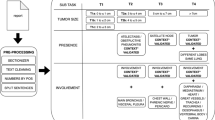Abstract
Cancer staging provides a basis not only for determining proper treatments for a patient but also for making future national-wide health plans. Despite its benefits, it is very difficult to obtain staging data because it is not commonly performed for all cancer patients or simply not collected. Moreover, it requires medical experts to do the analysis, incurring expensive cost. In this paper, we propose a method for semantic rule based determination of a cancer stage, which is considering a semantic type (e.g. body part, organ, or organ component). Compared to previous work, our work is unique in that we utilize radiology reports instead of pathological report since they are more available. Moreover, we argue that a rule-based approach is more suitable for cancer staging than machine learning because the international staging protocols specify certain conditions for determining stages. Since semantic type of words should be considered to determine the cancer stage and construct rules, we construct rules using MetaMap, which provides a meta-thesaurus of UMLS (Unified Medical Language System) for medical text. Based on our semantic rules, TNM (Tumor Nodes Metastasis) stages are determined for 275 reports of liver cancer. From our experiments, whole performance are highly incremented than machine learning approach.
Access this chapter
Tax calculation will be finalised at checkout
Purchases are for personal use only
Preview
Unable to display preview. Download preview PDF.
Similar content being viewed by others
References
Varotti, G., Ramacciato, G., Ercolani, G., Grazi, G.L., Vetrone, G., Cescon, M., Del Gaudio, M., Ravaioli, M., Ziparo, V., Lauro, A., Pinna, A.: Comparison between the fifth and sixth editions of the AJCC/UICC TNM staging systems for hepatocellular carcinoma: mul-ticentric study on 393 cirrhotic resected patients. European Journal of Surgical Oncology 31(7), 760–767 (2005)
Okuda, K.: Natural History of Hepatocellular Carcinomaand Prognosis in Relation to Treatment. CANCER 56, 918–928 (1983)
Talian, L.I.I., Lip, P.R.C.: A New Prognostic System for Hepatocellular Carcinoma: A Retrospective Study of 435 Patients. HEPATOLOGY 28(3), 751–755 (1998)
Lu, W., Dong, J., Huang, Z., Guo, D., Liu, Y., Shi, S.: Comparison of four current staging systems for Chinese patients with hepatocellular carcinoma undergoing curative resection: Okuda, CLIP, TNM and CUPI. Journal of Gastroenterology and Hepatology 23(12), 1874–1878 (2008)
Ueno, G., Tanabe, S.: Prognostic performance of the new classification of primary liver cancer of Japan (4th edition) for patients with hepatocellular carcinoma: a validation anal-ysis. Hepatol Res. 24(4), 395–403 (2002)
Kovalerchuk, B., Vityaev, E., Ruiz, J.F.: Design of consistent system for radiologists to support breast cancer diagnosis. In: Proc. Joint Conf Information Sciences, vol. 2, pp. 118–121 (1997)
McCowan, I., Moore, D.: Classification of cancer stage from free-text histology reports. Engineering in Medicine and 1, 5153–5156 (2006)
McCowan, I., Moore, D., Nguyen, A., Bowman, R.V., Clarke, B.E., Duhig, E.E., Fry, M.J.: Collection of cancer stage data by classifying free-text medical reports. Journal of the American Medical Informatics Association 14(6), 736 (2007)
Nguyen, A.N., Lawley, M.J., Hansen, D.P., Bowman, R.V., Clarke, B.E., Duhig, E.E., Colquist, S.: Symbolic rule-based classification of lung cancer stages from free-text pa-thology reports. Journal of the American Medical Informatics Association, JAMIA 17(4), 440–445 (2010)
Yu, H., Hripcsak, G.: Mapping abbreviations to full forms in biomedical articles. Journal of the American Medical Informatics Association, 262–272 (2002)
Hearst, M.A., Schwartz, A.S.: A simple algorithm for identifying abbreviation definitions in biomedical text. In: Pacific Symposium on Biocomputing, vol. 8, pp. 451–462 (2003)
Sohn, S., Comeau, D.C., Kim, W., Wilbur, W.J.: Abbreviation definition identification based on automatic precision estimates. BMC Bioinformatics 9, 402 (2008)
Pakhomov, S.: Semi-supervised maximum entropy based approach to acronym and ab-breviation normalization in medical texts. In: The Association for Computational Linguistics (ACL), pp. 160–167 (July 2002)
Stevenson, M., Guo, Y., Amri, A.A.: Disambiguation of biomedical abbreviations. In: Proceedings of the Workshop on BioNLP, pp. 71–79 (June 2009)
International Health Terminology Standards Development Organisation. SNOMED Clin-ical Terms User Guide, http://www.ihtsdo.org/snomed-ct/
Chang, J.: Creating an online dictionary of abbreviations from MEDLINE. Journal of the American Medical Informatics Association 9(6), 612–620 (2002)
NIH, Unified Medical Language System (UMLS), http://www.nlm.nih.gov/research/umls/
Aronson, A.R., Lang, F.-M.: An overview of MetaMap: historical perspective and re-cent advances. Journal of the American Medical Informatics Association, JAMIA 17(3), 229–236 (2010)
Chapman, W.W., Bridewell, W., Hanbury, P., Cooper, G.F., Buchanan, B.G.: A simple algorithm for identifying negated findings and diseases in discharge summaries. Journal of Biomedical Informatics 34(5), 301–310 (2001)
Schwartz, A.S., Hearst, M.A.: A simple algorithm for identifying abbreviation defini-tions in biomedical text. In: Pacific Symposium on Biocomputing, vol. 8, pp. 451–462 (2003)
Author information
Authors and Affiliations
Corresponding author
Editor information
Editors and Affiliations
Rights and permissions
Copyright information
© 2013 Springer-Verlag Berlin Heidelberg
About this paper
Cite this paper
Nam, S., Oh, HS., Kim, JB., Myaeng, SH., Choi, J. (2013). Semantic Rule-Based Determination of Cancer Stages from Free-Text Radiology Reports. In: Sidhu, A., Dhillon, S. (eds) Advances in Biomedical Infrastructure 2013. Studies in Computational Intelligence, vol 477. Springer, Berlin, Heidelberg. https://doi.org/10.1007/978-3-642-37137-0_6
Download citation
DOI: https://doi.org/10.1007/978-3-642-37137-0_6
Publisher Name: Springer, Berlin, Heidelberg
Print ISBN: 978-3-642-37136-3
Online ISBN: 978-3-642-37137-0
eBook Packages: EngineeringEngineering (R0)




